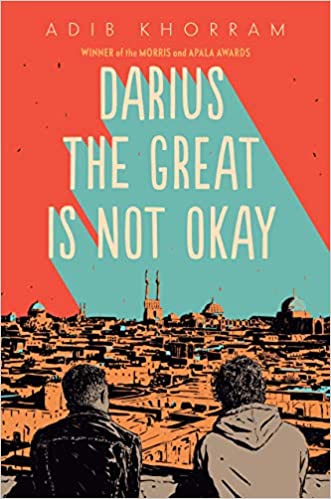Author: Adib Khorram
ISBN:978-0-5255-5297-0
APA Style Citation
Khorram, A. K. (2018). Darius the Great is not okay. Penguin Random House.
Buy This Book
https://www.amazon.com/Darius-Great-Okay-Adib-Khorram/dp/0525552960
| activity_darius_the_great_is_not_okay_.pdf |
Darius the Great is Not Okay is a young adult fictional novel that depicts the life of Darius (Darioush) Kellner. Darioush is half Persian and is named after the Persian King Darius the Great, although he feels the name is a clear case of misidentification. Darius lives in Portland, Oregon, and loves Persian tea, his little sister Laleh, and watching Star Wars with his father. None of these make for the perfect combination of popularity in high school. Darius is often on the receiving end of pranks and verbal ridicule from many of his classmates despite his school’s zero-tolerance policy on bullying. To add to his anxiety, Darius is targeted because he looks different than many of his classmates. He has thick curly hair and is overweight as a result of his love for pizza and spaghetti. Darius also suffers from clinical depression, as does his father, Stephen Kellner. Darius has one friend at school who shares his Persian background and a supportive family. Yet, he cannot help but think he is always disappointing people, especially his father, who Darius describes as the perfect Aryan. His father, Stephen Keller, is tall and muscular with blond hair and blue eyes. He is a successful architect who drives his beloved Audi, and Darius feels like he can never live up to his father’s expectations for him to fit in or play sports. Instead, he enjoys working at a tea shop and speaking in Klingon.
This book is a good read for high school students who can likely relate to many of Darius’s challenges. He is always concerned about fitting in and what other people think about him, and he worries about his future and his grades. Perhaps more importantly, however, the book allows the reader to peek into Darius’s brain to see how his depression distorts his thoughts and, as a result, his day-to-day interactions. The book is told from Darius’s perspective, and it eventually becomes clear that he is distorting his interactions to make them worse than they actually are. Darius is a sweet and caring boy, and he wants to make his parents proud, but he interprets any recommendation as a suggestion that he has done something wrong. Even when his classmates are trying to be kind, he interprets their words as mocking or threatening.
Darius’s grandfather is gravely ill, so the family plans a trip to Iran, where Darius and Lelah will meet their grandparents face-to-face for the first time. Darius’s mother was worried about returning since she has married an American and had not seen her parents for 18 years. Darius worries about what he will say to his grandparents and what it will be like to meet them rather than talk to them on a computer screen. He knows he should love them, but he wonders if he will. Right after arriving, Darius meets Sorhab, a neighbor who helps Darius’s grandfather around the house. Darius and Sorhab bond over their outsider status. Sorhab is Baha’i, which is a religion that some people in Iran look down upon in Iran. Sorhab and Darius quickly become friends, visiting the sites around Yazd, where Sorhab and Darius’s grandparents live, enjoying Persian treats, and mostly playing soccer. Darius feels like he can be himself around Sorhab and even shares the worries and negative thoughts that he never tells other people about. Sorhab does not judge Darius even if he cannot quite understand how Darius’s mind works. Darius gradually comes to understand that he has not been a disappointment to his family. They want him to be happy and accepted and worry for him. He understands that his father’s need to be away from Darius does not mean he does not love Darius, but it often means he needs to cope with his own depressive symptoms. The trip to Iran helps him understand that even though his younger sister speaks perfect Farsi, it does not mean he is a failure. His parents just realized that this would be a priority with their second child.
When the family returns from their trip, Darius accepts the compliments of his physical education coach, who encourages him to try out for the soccer team, which he makes. He realizes that some of the boys who he thought were making fun of him were really trying to be friendly. He also realizes that his depression and challenging his irrational thinking is something that he will have to live with for the rest of his life, but that many tools can help while he still remains the quirky and interesting Darius that he has always been.
Other Related Resources
Talk by author Adib Khorram
https://www.youtube.com/watch?v=FmuX3yqn5Us
Discussion questions for Darius the Great Is Not Okay
https://www.penguin.com/wp-content/uploads/2019/09/DariusGreat_DiscussionGuide_Web.pdf
Asian Pacific Library Association (APALA) Interview with Adib Khorram
https://www.apalaweb.org/apala-author-interview-adib-khorram/
Interview with Adib Khorram from Ya Sh3lf
https://www.yash3lf.com/interview-with-adib-khorram-author-of-darius-the-great-is-not-okay/
10 Reasons you should read Darius the Great is Not Okay
https://www.yash3lf.com/10-reasons-why-you-should-read-darius-the-great-is-not-okay/
Psychological Concepts and Figures
Anxiety
Bullying
Depression
Internalized thoughts
Irrational thinking
Pessimistic explanatory style
Stigma

 RSS Feed
RSS Feed